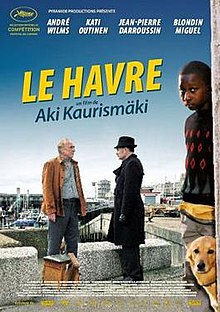
Anna Katriina "Kati" Outinen is a Finnish actress who has often played leading female roles in Aki Kaurismäki's films.

Aki Olavi Kaurismäki is a Finnish film director and screenwriter. He is best known for the award-winning Drifting Clouds (1996), The Man Without a Past (2002), Le Havre (2011), The Other Side of Hope (2017) and Fallen Leaves (2023), as well as Leningrad Cowboys Go America (1989). He has been described as Finland's best-known film director.
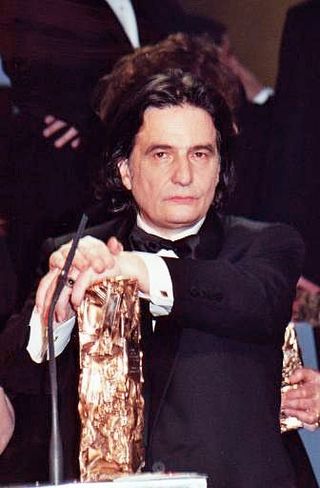
Jean-Pierre Léaud, ComM is a French actor best known for being an important figure of the French New Wave and his portrayal of Antoine Doinel in a series of films by François Truffaut, beginning with The 400 Blows (1959). He has worked with Jean-Luc Godard, Agnès Varda, and Jacques Rivette, as well as other notable directors such as Jean Cocteau, Pier Paolo Pasolini, Bernardo Bertolucci, Catherine Breillat, Jerzy Skolimowski, and Aki Kaurismäki.
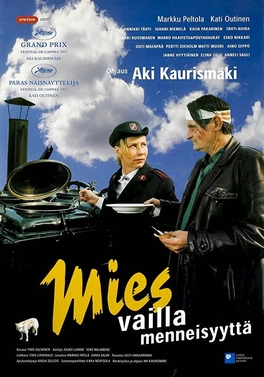
The Man Without a Past is a 2002 Finnish comedy-drama film produced, written, and directed by Aki Kaurismäki. Starring Markku Peltola, Kati Outinen and Juhani Niemelä, it is the second installment in Kaurismäki's Finland trilogy, the other two films being Drifting Clouds (1996) and Lights in the Dusk (2006). The film was nominated for the Academy Award for Best Foreign Language Film in 2002 and won the Grand Prix at the 2002 Cannes Film Festival.
The International Federation of Film Critics is an association of national organizations of professional film critics and film journalists from around the world for "the promotion and development of film culture and for the safeguarding of professional interests." It was founded in June 1930 in Brussels, Belgium. It has members in more than 50 countries worldwide.

The 55th Cannes Film Festival took place from 15 to 26 May 2002. American filmmaker David Lynch served as jury president for the main competition. Virginie Ledoyen hosted the opening and closing ceremonies.

Drifting Clouds is a 1996 Finnish comedy drama film edited, written, produced, and directed by Aki Kaurismäki and starring Kati Outinen, Kari Väänänen and Markku Peltola. The film is the first in Kaurismäki's Finland trilogy, the other two films being The Man Without a Past and Lights in the Dusk. The film was selected as the Finnish entry for the Best Foreign Language Film at the 69th Academy Awards, but was not accepted as a nominee.

Robert Jules Guédiguian is a French film director, screenwriter, producer and actor. Most of his films star Ariane Ascaride and Jean-Pierre Darroussin.
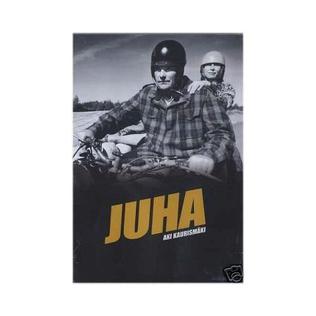
Juha is a 1999 Finnish film written, directed, produced and edited by Aki Kaurismäki. The film is loosely based on a famous 1911 novel Juha by the Finnish author Juhani Aho marking this as the fourth time the novel was adapted for the screen. The original story takes place in the 18th century but Kaurismäki's remake is set sometime in the latter half of the 20th century. It tells the story of a love triangle where a simple peasant woman leaves her husband after falling in love with a modern city slicker. Juha is a silent film shot in black-and-white with dialogue in the form of intertitles. Special release prints with titles in several different languages were produced for international distribution.

The 8th Cannes Film Festival was held from 26 April to 10 May 1955. The Golden Palm went to the US film Marty by Delbert Mann. The festival opened with Du rififi chez les hommes by Jules Dassin and closed with Carmen Jones by Otto Preminger.

André Wilms was a French film and television actor who also appeared in German and Finnish films. Wilms was the winner of the Best Supporting European Actor award at the 1992 European Film Awards for his work in Aki Kaurismäki's La Vie de bohème. He died on 9 February 2022, at the age of 74.

La Vie de bohème is a 1992 tragicomedy film directed by Aki Kaurismäki and starring Matti Pellonpää, Évelyne Didi and André Wilms. Kaurismäki's screenplay for the film was loosely based on Henri Murger's influential 1851 novel Scènes de la vie de bohème which has spawned several on-screen adaptations as well as plays and operas, the most notable being Giacomo Puccini's 1896 La bohème.

The 12th Cannes Film Festival was held from 30 April to 15 May 1959. The Palme d'Or went to the Orfeu Negro by Marcel Camus. The festival opened with Les Quatre Cents Coups, directed by François Truffaut and closed with The Diary of Anne Frank, directed by George Stevens.

The 49th Cannes Film Festival took place from 9 to 20 May 1996. American filmmaker Francis Ford Coppola served as jury president for the main competition. Sabine Azéma hosted the opening and closing ceremonies.

The 44th Cannes Film Festival was held from 9 to 20 May 1991. French-Polish filmmaker Roman Polanski served as jury president for the main competition.
Timo Salminen is a Finnish cinematographer best known for his artistic work in Aki Kaurismäki's films. Salminen's father Ville Salminen was a famed Finnish film actor, director, writer and producer whose career began in the 1930s and lasted until the 1980s. His older step brother Ville-Veikko Salminen was a comedic actor whose career also lasted over 50 years.

The 64th Cannes Film Festival |took place from 11 to 22 May 2011. American actor Robert De Niro served as the president of the jury for the main competition. American filmmaker Terrence Malick won the Palme d'Or, the festival's top prize, for the drama film The Tree of Life.

The Other Side of Hope is a 2017 Finnish comedy-drama film written, produced, and directed by Aki Kaurismäki. The film was produced by Kaurismäki's Finnish company Sputnik. The story is about a Finnish businessman who meets a Syrian asylum-seeker looking for his missing sister.
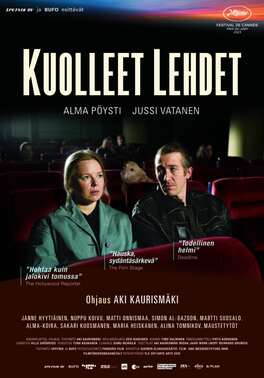
Fallen Leaves is a 2023 romantic comedy-drama film written and directed by Aki Kaurismäki. It is Kaurismäki's 20th full-length film and a continuation of his Proletariat series, which was originally planned as a trilogy and already includes Shadows in Paradise (1986), Ariel (1988), and The Match Factory Girl (1990). Alma Pöysti and Jussi Vatanen star in the main roles. The film is produced by Sputnik and Bufo.
